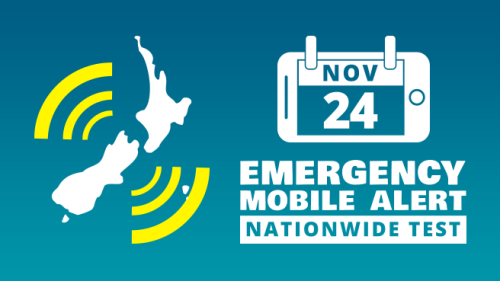

This Sunday, 24 November, more than half of New Zealand’s cell phones are expected to let off a loud, penetrating noise, marking the third annual nationwide Emergency Mobile Alert system test.
Hawke’s Bay Civil Defence Emergency Management Group Manager Ian Macdonald said everyone should expect to receive a test alert that evening sometime between 6pm and 7 pm.
“The alerts are sent using cell broadcast technology, so there is no need to sign up to a text alert or download an app,” Mr Macdonald said.
Emergency Mobile Alerts are messages about emergencies sent by authorised emergency agencies to capable mobile phones.
They can be targeted to areas affected by serious hazards and will only be sent when there is a serious threat to life, health or property, and for test purposes.
Mr Macdonald said more than 4 million cell phones in New Zealand are now expected to be capable of receiving an Emergency Mobile Alert message.
“That means that even if your own phone isn't one of them, you'll probably be near someone who does receive an alert,” Mr Macdonald said.
“We expect this number to increase over time as more people upgrade their phones.”
Mr Macdonald said Emergency Mobile Alert is an additional channel to help keep New Zealanders safe in an emergency and did not replace other information channels such as radio, websites and social media, or the need to take action after natural warnings.
“Fast and reliable information is crucial when emergencies strike and Emergency Mobile Alert is another vital information channel for alerting people if their life, health or property is in danger,” Mr Macdonald said.
“However, no form of technology is completely failsafe, so it doesn’t replace other alerting channels such as radio or social media, or the need to act upon natural warning signs.”
If you feel your life may be in danger, don’t wait for an official warning – take immediate action, he said.
“For example, in local-source tsunami, there will not be time to send an alert before the first waves strike.
“Please recognise the natural warnings and get safe – if an earthquake is long or strong, get gone.”
Mr Maconald said the annual nationwide test would help ensure the system works effectively, while familiarising people with what to expect and how it works.
“This is just a test, but when emergencies happen, Emergency Mobile Alert will be a vital channel to help keep our communities safe.”
The alert messages can only be sent by the Ministry of Civil Defence & Emergency Management, regional Civil Defence Emergency Management groups, New Zealand Police, Fire and Emergency New Zealand, the Ministry of Health and the Ministry of Primary Industries.
For more information on the Emergency Mobile Alert system, visit www.getready.govt.nz/emergency-mobile-alert/
20 November 2019
Disclaimers and Copyright
While every endeavour has been taken by the Hawke's Bay Emergency Management to ensure that the information on this website is
accurate and up to date, Hawke's Bay Emergency Management shall not be liable for any loss suffered through the use, directly or indirectly, of information on this website. Information contained has been assembled in good faith.
Some of the information available in this site is from the New Zealand Public domain and supplied by relevant
government agencies. Hawke's Bay Emergency Management cannot accept any liability for its accuracy or content.
Portions of the information and material on this site, including data, pages, documents, online
graphics and images are protected by copyright, unless specifically notified to the contrary. Externally sourced
information or material is copyright to the respective provider.
© Hawke's Bay Emergency Management - hbemergency.govt.nz / / enquiries@hbemergency.govt.nz